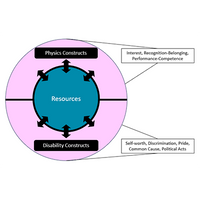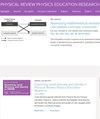Diverging nonlocal fields: Operationalizing critical disability physics identity with neurodivergent physicists outside academia
IF 3.6
2区 教育学
Q1 EDUCATION & EDUCATIONAL RESEARCH
Physical Review Physics Education Research
Pub Date : 2024-02-29
DOI:10.1103/physrevphyseducres.20.010111
引用次数: 0
Abstract
Science, technology, engineering, and mathematics (STEM) education research and physics education research, in particular, are currently struggling with a dearth of research into understanding the experiences and identity development of neurodivergent students. In addition, an even larger gap in research exists looking into nonacademic members who have left the field and still strongly identify with their disciplinary identity. As valued members of our physics community, these colleagues provide a unique perspective as to how identity and participation are nurtured and developed, particularly among rising disabled physicists. To resolve these current issues and aid in future research, we operationalize our new Critical Disability Physics Identity framework and present results from interviews with three neurodivergent post-baccalaureate nonacademic physicists (those who have left physics and retain a strong affinity toward their identity as a physicist). As the first paper in a four-part phenomenological study into the identity development of neurodivergent physicists, we also present an analysis of each interview through a Critical Disability Physics Identity lens and discuss the implications of their Critical Disability Physics Identity development. We find that neurodivergent students experience very little outright discrimination and violence but experience structural ableism in the form of assessment that is not constructed for how neurodivergent physicists perform physics-related tasks. Additionally, we find that neurodivergent physicists seem to ground identity in having a strong interest in physics, something that is only shaken by professors and others in power being neutral toward the discrimination experienced by neurodivergent people. We find that there are very large power imbalances between professors and neurodivergent students and that only when professors and others in power are actively anti-ableist is this power imbalance remedied and neurodivergent students begin to feel that they are physicists.

分歧的非局部领域:与学术界以外的神经变异物理学家一起操作关键残疾物理学身份
科学、技术、工程和数学(STEM)教育研究,尤其是物理教育研究,目前正苦于缺乏了解神经变异学生的经历和身份发展的研究。此外,对于已经离开本领域但仍然强烈认同其学科身份的非学术成员的研究存在着更大的差距。作为物理学界的重要成员,这些同事提供了一个独特的视角,让我们了解身份认同和参与是如何培养和发展的,尤其是在新晋残疾物理学家中。为了解决这些当前的问题并帮助未来的研究,我们将新的 "关键残疾物理学家身份认同"(Critical Disability Physics Identity)框架付诸实践,并展示了对三位神经变异的学士后非学术物理学家(那些已经离开物理学界,但对物理学家身份仍有强烈认同感的人)的访谈结果。作为由四部分组成的神经偏离物理学家身份发展现象学研究的第一篇论文,我们还通过 "临界残疾物理身份 "的视角对每次访谈进行了分析,并讨论了他们的 "临界残疾物理身份 "发展的意义。我们发现,神经发育异常的学生几乎没有经历过直接的歧视和暴力,但却经历过结构性的能力歧视,其表现形式为评估不是针对神经发育异常的物理学家如何完成物理相关任务而构建的。此外,我们还发现,神经发育异常的物理学家似乎将对物理的浓厚兴趣作为身份认同的基础,而只有教授和其他掌权者对神经发育异常者所遭受的歧视保持中立,才能动摇他们的身份认同。我们发现,教授和神经异能学生之间存在着巨大的权力失衡,只有当教授和其他掌权者积极反对无能主义时,这种权力失衡才会得到补救,神经异能学生才会开始觉得自己是物理学家。
本文章由计算机程序翻译,如有差异,请以英文原文为准。
求助全文
约1分钟内获得全文
求助全文
来源期刊

Physical Review Physics Education Research
Social Sciences-Education
CiteScore
5.70
自引率
41.90%
发文量
84
审稿时长
32 weeks
期刊介绍:
PRPER covers all educational levels, from elementary through graduate education. All topics in experimental and theoretical physics education research are accepted, including, but not limited to:
Educational policy
Instructional strategies, and materials development
Research methodology
Epistemology, attitudes, and beliefs
Learning environment
Scientific reasoning and problem solving
Diversity and inclusion
Learning theory
Student participation
Faculty and teacher professional development
 求助内容:
求助内容: 应助结果提醒方式:
应助结果提醒方式:


